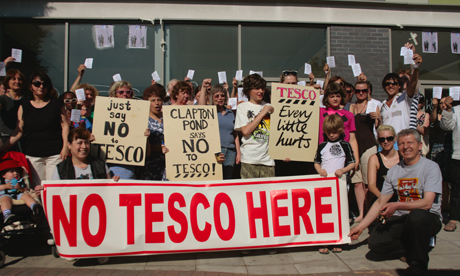Shoppers: put your money where your mouth is

Local residents protesting last year over plans for a Tesco on Lower Clapton Road Photograph: Hackney Citizen
They’re on my east London patch all the time: large vans, often unavoidably double-parked, emblazoned with the legends “Sainsbury’s”, “Ocado” or “Tesco”. From these emerge men bearing heavy plastic crates who head for the neighbourhood‘s smarter front doors. Home food deliveries by supermarket giants are part of life’s routine among the local, over-busy affluent. I wonder how many of these are opposed to the arrival of a Tesco Express just down the road, even as employees of the same company or others like it to unload produce into their halls. Maybe quite a few.
This scenario, with its whisper of a double standard, captures the challenge for the sorts of concerned citizen all across the land that regard the expansion of supermarkets into corner shop country as a menace to society. They foresee small independent traders driven out of business, the demoralising sight of boarded-up shop fronts and the homogenisation of neighbourhoods. They resent the economic and legal muscle with which the super-chains see off opposition and bemoan the inability of local authorities to stop them. They organise protests accordingly.
I sympathise. But the problem with people objecting to the success of supermarket chains is that in so doing they’re also objecting to the consumer decisions other people make. We can argue that the dominance of a handful of food monsters ends up limiting choice, but not that anyone is forced to buy from a newly arrived supermarket in the first place. Unless Tesco has misjudged the market – not a failing for which it is renowned – it knows that plenty of folk from around my way will welcome it.
Tesco Express will surely score on price compared with independent competitors. This may not be so across the board but, as the butcher I use told me, if the giant round the corner makes an offer of two chickens for the price of one he’ll struggle to match it. Bargains such as that make a big difference to people on tight incomes who are more likely to go out to do their shopping daily than to place a three-figure order online once a week. Some complain that our independent mini-markets charge too much. Are they to be criticised if they prefer the cheaper newcomer? And what about Adam, commenting on my local blog?
“Can someone tell me where on lower Clapton road you can get decent organic meat and GENUINELY fresh fruit and veg (that hasn’t been lying around for days) for a decent price? The quality and freshness of such items in the current local businesses is questionable.”
He thinks having a Tesco Express will be “fantastic”. I think its imminent arrival has already created a fascinating test case. My nearest corner shop is, as my neighbour the top London blogger Emily Webber wrote, friendly, unique and eagerly responsive to the needs of its wide variety of customers.
It’s been preparing shrewdly for Tesco’s opening: new services include refilling Ecover bottles, looking after parcels if they’re delivered when you’re out and, yes, bringing your grocery order to your home. Their delicatessen counter has enlarged and improved. They do posh coffee and homemade soup. The other day I caught a friend swooning over the six different types of mushroom on display. It has identified its own strengths and is making the most of them.
My friend the mushroom-fancier hopes that, in the end, we’ll all be winners: that Tesco will inspire all the local independents to think harder about providing a better or different service and end up flourishing rather than dying. I hope he’s right. But if he’s wrong, then some of those predictions of disaster will come true. Unless and until some localist statute gives councils greater powers to control the composition of their high streets there’s really only one weapon at the disposal of those who see the big supermarkets as a colonising threat. That is to do what I’m trying to do: reduce their dependency on supermarkets and spend more at the local independent shops they value. To mangle a metaphor, they must put more of their money where they also put their food.
guardian.co.uk © Guardian News & Media Limited 2010
Published via the Guardian News Feed plugin for WordPress.
